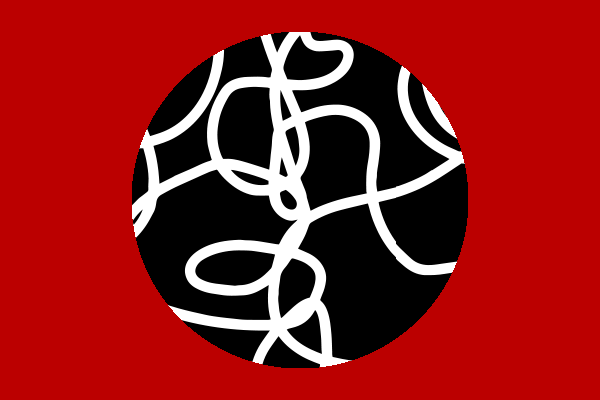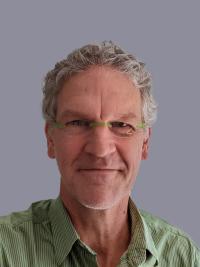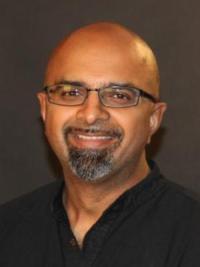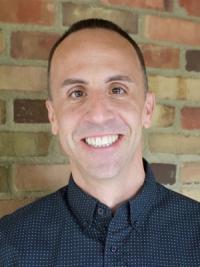Associate Professors David Adams, Pranav Jani and Professor Ryan Friedman named to the 2023-24 Society of Fellows Faculty Cohort

Associate Professors David Adams, Pranav Jani and Professor Ryan Friedman have been named as members of The Global Arts + Humanities Discovery Theme’s 2023-24 Society of Fellows Faculty Cohort.
The Society of Fellows cultivates a multidisciplinary community of individuals who “support the synthesis and translation of knowledge across disciplines to engage critical societal challenges in the form of an annual theme.” With the help of these fellowships, faculty members get the opportunity to focus on their respective scholarly and/or creative endeavors that support the theme of the seminar, which for this year is Freedom Dreams. The theme focuses on “past and present struggles to eradicate oppressive systems and envision more life-affirming and equitable futures.”

Adams’ project, Ableist Keywords: Dismantling Psychiatric Knowledge, “focuses on the ways psychiatric knowledge can be oppressive, sometimes harming more than helping the most vulnerable.” Adams explains that the project “examines ‘ableist keywords’ to help make us more aware of terms that marginalize rather than liberate people.” As a member of the Society of Faculty Fellows Adams will have additional time for research and writing, which he hopes will “provide a community for disseminating new ideas and building solidarity. Abolition requires broad collaboration in developing new ways of thinking and new ways of interacting with each other.” Speaking to the theme of Freedom Dreams, Adams says, “the abolition of punitive, carceral institutions are best accompanied by collective dreams of freedom, by bold imagining of alternative ways to live communally. In making readers more aware of how pervasive, contingent, and oppressive psychiatric knowledge can be, I hope my project helps open up space to imagine more equitable, life-affirming futures.” Adams declares that the “humanities and arts are vital for understanding how language works and how knowledge evolves; they are vital for helping us understand the ways in which our culture can refashion the realities we inhabit.”

Jani’s project, 1857 and the Anticolonial Imagination: Militancy, Nationalism and the Specter of Hindutva, “discusses anticolonial militancy in British India, examining how it intersects with gender and caste politics, Gandhism and Hindu nationalism.” In his manuscript, Jani investigates “portrayals of the 1857 Rebellion in various texts and media, from the 19th century to the 21st, to examine how Indians/South Asians have imagined the abolition of the British Empire and the tensions and unevenness in the process.” Working with the GAHDT facilitators Professor Wendy S. Hesford and Professor Treva Lindsey, along with fellow scholars on the topic of freedom dreams “situate[s] my topic of anticolonial militancy in India and South Asia within contemporary discussions of abolition, especially as developed within the context of the Black Lives Matter movement. There is a long history of thought and discussion on militancy and revolution, but very often it is siloed by topic and field. I look forward to enriching conversations across fields, geographical spaces, and disciplines.” The theme of Freedom Dreams aptly suits Jani’s academic work and community activism: “I appreciate that the emphasis is not only on analyzing and fighting systems of oppression and exploitation but doing it from the perspective that they can be eradicated, that we can imagine and bring into being futures that bring about freedom and liberation. Whether as a scholar studying the literatures, speeches and histories of colonized and minoritized peoples or as an activist and organizer, I always look at not only what needs to be torn down, but how they/we imagine what gets put in its place.”

Friedman’s project, Holding Their Own: African American Musical Specialties in U.S. Cinema, focuses on “the phenomenon of African American musical ‘specialty numbers’ in both Hollywood and Black-independent films from the 1930s and 40s. [These] ‘specialties’ are non-narrative scenes in which star musical artists (singers, dancers or instrumentalists) appear as themselves, playing to an onscreen audience.” Specifically, Friedman is interested in the “productively disruptive effects of Black specialty numbers within both of these cinematic contexts and in how they afford opportunities for self-affirming performances, despite seeming to relegate African American artists to a marginal space.” He views “the cinematic convention of the specialty as a site of freedom dreaming for Black artists and audiences alike. The artists who featured in film specialties were often categorized as ‘eccentric’ performers […] and they therefore participate in a tradition that performance theorist Daphne Brooks has characterized as working from an ‘off-center’ (the literal meaning of eccentric) position relative to the dominant culture, in order to ‘enact their own “freedom dreams.”’”
During his fellowship, Friedman looks forward to expanding the archival research the project requires: “I am looking at a wide range of materials where the history of these films production, distribution and reception are documented, from African American weekly newspapers to studio files, to film-industry periodicals. More importantly, [this fellowship] provides me with a great opportunity to learn from the other scholars in the cohort, [who] research related topics but in a variety of other fields of study and employing other theories and methodologies with which I am eager to engage.” His hope with the project is to prompt readers to revisit the films he discusses and to consider them in new contexts. “By shifting how we think about the workings of artistic and social agency in studying the history of these films, a more complex and potentially empowering picture emerges.”
